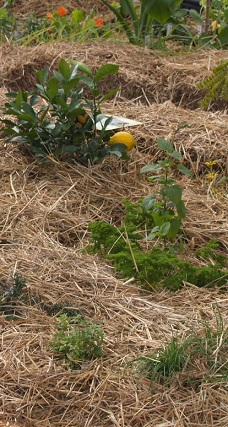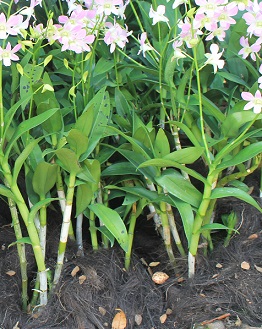 Summer can be a testing time for plants in any garden.
Summer can be a testing time for plants in any garden.
As the weather gets warmer and days longer, the foliage of plants are going to be exposed to hot air; and the roots are likely to become warmer as well, as the spoil heats up. Most plants grow best at temperatures between about 15 and 24 degrees celsius; and clearly summer heat can go beyond that. In addition, hotter conditions result in drier conditions. When plants do get watered, humidity will be higher in the heat, and with increased humidity comes increased risk of disease
Mulching plants Combats Excessive Heat
Inorganic mulches (eg. pebbles) can help plants; but organic mulch is even better.
Organic mulches comprised of garden clippings and leaves may be beneficial when added to garden beds and containers. Some benefits of adding layers of organic mulches include:
- Weeds are suppressed
- Soil moisture is conserved
- Weeds that germinate in the mulch are easier to pull out
- Soil structure and fertility is improved as the organic material breaks down
- Soil temperatures fluctuate less
- Earthworms and other beneficial soil life thrive under the mulch layer
- Soil erosion is minimised
Organic mulches will indirectly improve the soil. The elements (air, rain, wind etc.) will gradually break down the mulch material and this will be incorporated into the soil by soil organisms. Thus the organic matter content of the soil is raised. This process replicates nature very closely – fallen leaves and other materials form natural mulch which is broken down and incorporated into the soil in much the same way. Organic mulches are therefore very appropriate in a natural or wild garden.
How to Lay Mulch
 Get levels and drainage right before putting down mulch material.
Get levels and drainage right before putting down mulch material.
Eradicate weeds before laying the mulch (e.g. dig out and destroy, or spray with a systemic herbicide and leave for 7 14 days). If you live where frosts are regular feature of the winter, do not put much on the soil when it is frozen because it will insulate the soil and it will remain frozen for longer
General Rules
- Most organic materials which haven't been composted (e.g. with straw, hay, wood shavings), will initially cause nitrogen to be drawn from the soil as they are broken down. As mulch, they will starve plants of nutrients. Therefore you need to apply a dressing of slow release nitrogen around the base of plants to compensate.
- A layer of newspaper underneath reduces the thickness of mulch needed (saves money).
- Mulch should be shallower around the base of plant. Create a basin in the mulch around the stem otherwise mulch can cause collar rot.
- Some mulches settle to form a thinner layer (i.e. an application of 20cm deep mulch may reduce after a month to only 10cm thick).